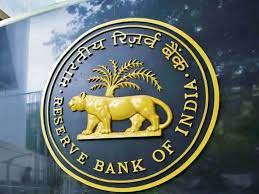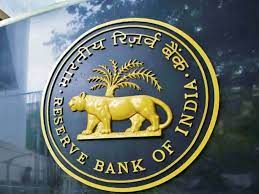
In an effort to stop the rupee's decline, the Reserve Bank of India has asked local banks not to increase their positions in the non-deliverable forward market. This request, according to bankers and traders, could cause offshore volatility to spill over into local markets.
According to one of the bankers, the RBI is being forced to use more reserves to defend the rupee because of the accumulation of positions in this market segment.
In contrast to the directives it issued in June 2020, which permitted banks operating from the International Financial Services Centre Banking Units to trade in the NDF segment, the RBI's informal communication to local bankers is a step backward.
After research revealed that the NDF market, which was dominated by foreign banks and over which the RBI had little control, fueled volatility and frequently drove the spot rupee lower in stressful situations, the central bank took action in 2020. If Indian banks were permitted to trade in the market, RBI would have more control.
The spot rupee is already under pressure, but increased trading in the segment has increased demand for dollars, forcing the RBI to intervene through dollar sales.
According to the RBI's assessment, the NDF was "nullifying the impact of their intervention" and increasing forward market liquidity, neither of which it desired, according to Kotak Securities' head of research for forex and interest rates, Anindya Banerjee.
In the meantime, the rupee's sharp depreciation in recent days had created opportunities for arbitrage between onshore and offshore rates. The arbitrage increases demand for dollars domestically while increasing liquidity internationally.
For instance, the 3-month forward rate is currently about 25 paisa higher than the corresponding onshore rate for the USD/INR NDF 1-month rate.
Approximately two weeks ago, these differences were close to 2 and 8 paisa, respectively.
Eligible banks could buy spot dollars onshore and pay a 1-month premium while selling USD/INR 1-month in the NDF market to benefit from this arbitrage.
"When you arbitrage, you use dollar leverage and that, we think, has become a concern for the RBI," said Abheek Barua, an economist at HDFC Bank.
"Now that banks are not being allowed, the NDF will start having more of an influence (on the rupee exchange rate)," he said, adding the extent of the influence would depend on the overall RBI intervention.
Bankers contend that the RBI's restrictions on banks' NDF activity won't relieve pressure on the rupee. Instead, it would result in offshore rates once more having a greater impact on the exchange rate of the rupee.
"The problem is that with banks now told to step aside, the difference between NDF and onshore will persist," a trader at a foreign bank said.
Bankers told Reuters that the RBI had clamped down on outright activity on the NDF. Trading forward basis points, or the difference between two maturities, is still allowed.
There was no comment from RBI on the issue.
(Source:www.reuters.com)
According to one of the bankers, the RBI is being forced to use more reserves to defend the rupee because of the accumulation of positions in this market segment.
In contrast to the directives it issued in June 2020, which permitted banks operating from the International Financial Services Centre Banking Units to trade in the NDF segment, the RBI's informal communication to local bankers is a step backward.
After research revealed that the NDF market, which was dominated by foreign banks and over which the RBI had little control, fueled volatility and frequently drove the spot rupee lower in stressful situations, the central bank took action in 2020. If Indian banks were permitted to trade in the market, RBI would have more control.
The spot rupee is already under pressure, but increased trading in the segment has increased demand for dollars, forcing the RBI to intervene through dollar sales.
According to the RBI's assessment, the NDF was "nullifying the impact of their intervention" and increasing forward market liquidity, neither of which it desired, according to Kotak Securities' head of research for forex and interest rates, Anindya Banerjee.
In the meantime, the rupee's sharp depreciation in recent days had created opportunities for arbitrage between onshore and offshore rates. The arbitrage increases demand for dollars domestically while increasing liquidity internationally.
For instance, the 3-month forward rate is currently about 25 paisa higher than the corresponding onshore rate for the USD/INR NDF 1-month rate.
Approximately two weeks ago, these differences were close to 2 and 8 paisa, respectively.
Eligible banks could buy spot dollars onshore and pay a 1-month premium while selling USD/INR 1-month in the NDF market to benefit from this arbitrage.
"When you arbitrage, you use dollar leverage and that, we think, has become a concern for the RBI," said Abheek Barua, an economist at HDFC Bank.
"Now that banks are not being allowed, the NDF will start having more of an influence (on the rupee exchange rate)," he said, adding the extent of the influence would depend on the overall RBI intervention.
Bankers contend that the RBI's restrictions on banks' NDF activity won't relieve pressure on the rupee. Instead, it would result in offshore rates once more having a greater impact on the exchange rate of the rupee.
"The problem is that with banks now told to step aside, the difference between NDF and onshore will persist," a trader at a foreign bank said.
Bankers told Reuters that the RBI had clamped down on outright activity on the NDF. Trading forward basis points, or the difference between two maturities, is still allowed.
There was no comment from RBI on the issue.
(Source:www.reuters.com)





